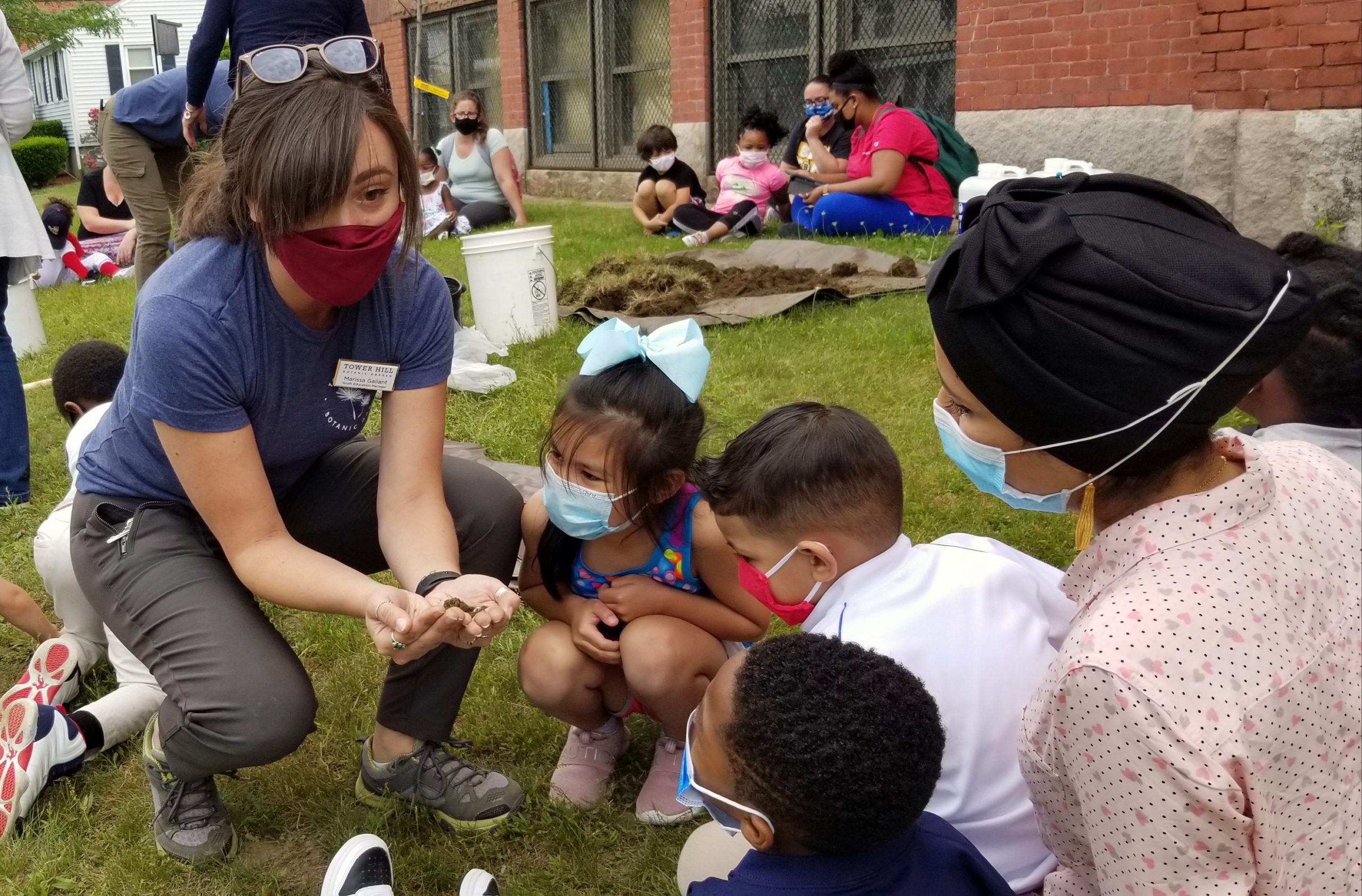Each year the Worcester Business Journal names local professionals, individuals with promising careers and a commitment to the community, to their “40 Under Forty” list. The Garden is thrilled to celebrate Marissa Gallant, Manager of Youth Education, as part of this year’s 40 Under Forty Class of 2022!

Marissa Gallant, Manager of Youth Education, plants trees with kids during a Head Start program.
Marissa, who joined the Garden team in 2018, develops educational initiatives that bring hands-on, nature-based learning opportunities to more than 5,000 Central Massachusetts children, youth, and families each year. By collaborating with Worcester Public Schools and local youth-serving organizations, Marissa develops meaningful, accessible learning opportunities for the community.
We caught up with Marissa to talk about her work at the Garden, her passion for promoting science literacy, and her infamous collection of dead insects.
NEBG: First, how’s it feel to be a 40 Under Forty recipient?
Marissa: It’s definitely a special honor. I grew up in Worcester. I went to Chandler Magnet Elementary, Forest Grove Middle, and Doherty High School. It’s great to be recognized by the WBJ for helping bring environmental education to my community.
NEBG: When did your love of nature start?
Marissa: I think I was always a “nature kid.” I was always playing outside, especially in the summer. I liked exploring the outdoors and seeing all the cool stuff that you can find in nature. Early on, I knew that when I went to college, I’d want to study science. I earned my Bachelor of Science in Environmental Science from Roger Williams University and then my Masters of Science in Environmental Science and Policy from Clark University. It was during my master’s program, in a sort of round-about way, that I found my path to informal science education.
NEBG: The youth education programs you’ve developed at the Garden cover a range of environmental topics. Some, like climate change and environmental justice, can be scary and complex. Are there ever things that surprise you when teaching young kids about the environment?
Marissa: I don’t think we give kids enough credit. I think that children can absolutely understand complex science topics, and I’m always impressed with the amount that kids already know, or the connections they’re able to make. They grasp complex content by being immersed in it and seeing it play out in front of them. We could be doing a class where we’re making slime, but we’re learning about the water cycle, water pollution, and the Great Pacific Garbage Patch at the same time. From parents, I often hear things like, “Oh, wow, I didn’t think my child could understand this concept,” or, “My child is really pressuring me to recycle properly.” Through some of our multi-session programs, like Growing Green, we really get to see how excited kids are to take what they’re learning and apply it to their lives. They love to tell us all about what they’ve been doing to save the planet, or how the tree we planted together is still alive, or how other plants or seeds they planted have been growing. It’s exciting and empowering for them to see themselves as agents of change — our next generation of planet protectors.
NEBG: What’s your favorite environmental topic to teach about?
Marissa: Insects! I love our insect programs, and we teach a bunch of them, like our Insect Safari. A lot of kids hate bugs, and a lot of adults hate bugs, but insects are a really important part of our ecosystem, especially the ecosystem at a botanic garden. Being able to shift someone’s thinking from, “Oh, gross. Bugs!” to “Oh, cool! Bugs!” is so fun.
NEBG: It’s sort of an unspoken rule at the Garden that interesting, deceased insects found on the property go to Marissa’s collection. For curious readers, how many dead bugs are currently in your office?
Marissa: Quite a lot. Probably 20 butterflies and a lot of other assorted insects — bees, dragonflies, beetles. Small insects tend not to hold up well over time, but larger ones sure do. Butterflies are everybody’s favorite. Typically, in the morning, I like to take a look around the Garden for corpses to add to my collection.
NEBG: Speaking of favorites, to wrap up, what’s your favorite thing about working at New England Botanic Garden?
Marissa: One of my very favorite things is introducing kids to nature, especially if they haven’t had many opportunities to explore plants, animals, and ecosystems. I love that I can share my passion for nature education with my community. Every ‘a ha’ moment we see happen at the Garden gives me hope for the future.
You can visit https://nebg.org/youth-family-programs/ for more information about the wide variety of educational programs, including community engagement programs, that Marissa and the Garden’s Education Team offer year-round. Check out our calendar of events to see what’s coming up!
—Liz Nye, New England Botanic Garden, August 2022
